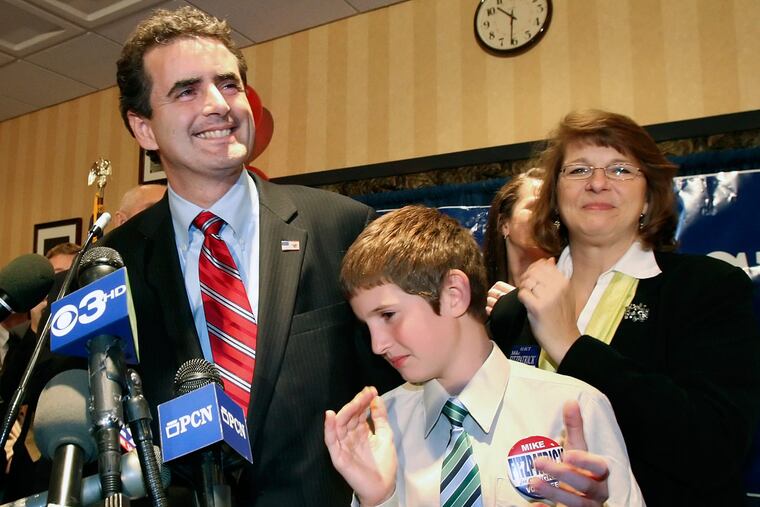Bucks congressman fixes on medical device safety
For much of his congressional career, U.S. Rep. Mike Fitzpatrick focused on policy issues from national security, to taxes, to health care.

For much of his congressional career, U.S. Rep. Mike Fitzpatrick focused on policy issues from national security, to taxes, to health care.
Medical device safety wasn't high on the list.
But that changed in 2014 when Fitzpatrick had a chance meeting with cardiac surgeon Hooman Noorchashm and his wife, Amy Reed, an anesthesiologist, during a Christmas parade in Yardley.
Noorchashm and Reed approached Fitzpatrick and in an hour-long talk in the chilly rain told him the disturbing story of how a widely used device called a power morcellator had spread an aggressive uterine cancer through Reed's abdomen during a hysterectomy.
Since then, Fitzpatrick, a Bucks County Republican, has become the leading voice in Congress on medical device safety. He has pressed the FDA to explain why morcellators stayed in wide use even as information began to accumulate that, for many women, the devices had led to death or serious injury.
He has also focused on safety problems with Bayer AG's permanent birth-control device, Essure, which many women complain has led to fetal deaths and chronic health problems.
In September, he persuaded the Government Accountability Office to study the FDA's process for approving morcellators and monitoring their performance once they hit the market. And he has repeatedly pressed the House, with little success, to adopt measures he says will improve FDA oversight.
"Congressman Fitzpatrick has probably been one of the only [members] who has listened to us and acted," Noorchashm said. "He has been the most vocal and effective voice in all of Congress, on medical device safety and women's health."
Cracking down on device makers isn't a central policy theme for congressional Republicans. In fact, Fitzpatrick has spent much of his career on staple GOP issues such as cutting taxes and promoting small businesses. Like colleagues, he also is a sharp critic of President Obama's Affordable Care Act.
But Fitzpatrick, 52, who lives with his wife, Kathy, and six children in Levittown, says his concern with medical-device safety goes beyond party politics and ideology.
It's a constituent issue, he says. If the FDA approves a medical device, then patients should have confidence that it is safe.
He grants that many, if not most, devices have improved the lives of patients, but says as with power morcellators and Essure, harmful effects become more fully known only after they are used in thousands of patients. The FDA, physicians, and hospitals have dropped the ball in following up, he says. Ethicon, owned by pharma giant Johnson & Johnson, has withdrawn its morcellator from the market in response to safety problems. Bayer AG, the maker of Essure, admits that there have been complications but maintains that the vast majority of women who use it have benefited.
"The issue is once the FDA has approved it and it is out there and you have found people who have been harmed, what is your process for dealing with that?" said Fitzpatrick. "They are excruciatingly slow and ineffective in withdrawing something from the market."
Fitzpatrick is not running again this year, having pledged to leave after four terms. His brother Brian, a former FBI supervisory agent, is running to replace him.
Fitzpatrick's focus on health is far from academic. In 2008, he was diagnosed with stage three colon cancer. He underwent intense rounds of chemotherapy and has since recovered.
The experience, he says, caused him to appreciate the challenges of people with serious health problems.
Signs of problems with the morcellator, a surgical instrument with spinning blades that grind up fibrous uterine tissue, began to emerge 10 years ago when a central Pennsylvania physician found that there was a 1 in 300 chance that the procedure could spread cancerous cells. The doctor alerted Ethicon to the risk.
Yet it wasn't until 2014 that the FDA officially warned patients and doctors by placing a black-box warning on the product.
The FDA now has two approval tracks for medical devices. In the more stringent one, called pre-market approval, devices are subject to extensive safety testing before launch. The FDA approves 70 to 80 devices each year in this way. And this was the process through which Essure got the go-ahead. It also uses a less rigorous process for devices deemed substantially similar to those already on the market on the theory the safety record of a "predicate device" can guide regulators. The less rigorous approach was used for morcellators.
Hospitals and doctors are required to report to the FDA serious injuries or deaths caused by a device. But Fitzpatrick says this is not happening.
He has queried the FDA on several cases involving women who had uterine fibroids removed with power morcellators, and then died from leiomyosarcoma, an aggressive uterine cancer that spreads through the body. And he has asked the FDA's office of criminal investigations to look into whether the hospitals where the women had the procedure reported their deaths to the FDA, as required.
Of the women who say they were injured by Essure and morcellators, Fitzpatrick said the FDA must "listen to their stories because those stories have merit. And to this point in time, no one has listened to them."
215-854-5957@cmondics